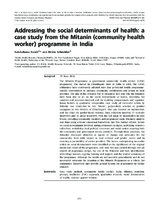Addressing the social determinants of health: A case study from the Mitanin (Community Health Worker) programme in India
Abstract
The Mitanin Programme, a government community health worker (CHW)
programme, was started in Chhattisgarh State of India in 2002. The CHWs
(Mitanins) have consistently adopted roles that go beyond health programme-
specific interventions to embrace community mobilization and action on local
priorities. The aim of this research was to document how and why the Mitanins
have been able to act on the social determinants of health, describing the
catalysts and processes involved and the enabling programmatic and organiza-
tional factors. A qualitative comparative case study of successful action by
Mitanin was conducted in two ‘blocks’, purposefully selected as positive
exemplars in two districts of Chhattisgarh. One case focused on malnutrition
and the other on gender-based violence. Data collection involved 17 in-depth
interviews and 10 group interviews with the full range of stakeholders in both
blocks, including community members and programme team. Thematic analysis
was done using a broad conceptual framework that was further refined. Action
on social determinants involved raising awareness on rights, mobilizing women’s
collectives, revitalizing local political structures and social action targeting both
the community and government service providers. Through these processes, the
Mitanins developed identities as agents of change and advocates for the
community, both with respect to local cultural and gender norms and in
ensuring accountability of service providers. The factors underpinning successful
action on social determinants were identified as the significance of the original
intent and vision of the programme, and how this was carried through into all
aspects of programme design, the role of the Mitanins and their identification
with village women, ongoing training and support, and the relative autonomy of
the programme. Although the results are not narrowly generalizable and do not
necessarily represent the situation of the Mitanin Programme as a whole, the
explanatory framework may provide general lessons for programmes in similar
contexts.

